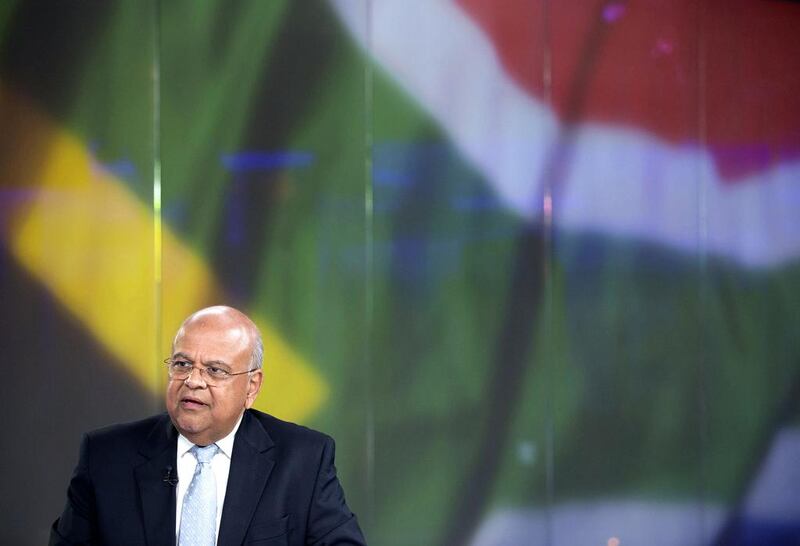Johannesburg // South Africa’s struggling economy took a hit this week after the country’s prosecuting authority said it would press ahead with corruption charges against the finance minister.
On Tuesday the head of South Africa’s National Prosecuting Authority Shaun Abrahams said the organisation would press ahead with its bid to bring Pravin Gordhan to court to face charges that he illegally helped a former colleague retire early with benefits to which he was not entitled.
The news sent the country’s currency plunging and wiped nearly 50 billion rand (Dh12.78bn) off the value of the Johannesburg Stock Exchange.
Mr Gordhan’s impending arrest is widely viewed as an attempt to remove him from office as part of an internal power struggle within the ruling African National Congress. His job security is being closely watched both at home and by international investors, who see him as a fiscal bodyguard against state overspending.
“The announcement about Gordhan will exacerbate an already negative investor sentiment towards the country,” said Prof Philippe Burger from the department of economics at the University of the Free State. “To investors it is a sign of an ongoing slow erosion of the country’s key institutions, and heightens fears that once the Treasury falls, we may see a profligate fiscus, mounting public debts and even more corruption.”
Mr Gordhan is seen as the key obstacle to the ambitions of a political faction led by his boss, the president Jacob Zuma, to build a fleet of nuclear power stations as well as several other big budget capital projects.
These projects have long been the subject of speculation in the local media, which has repeatedly linked them to a group of influential businesspeople who are part of the president’s inner circle.
The country’s constitution requires Treasury approval for large capital projects, and Mr Gordhan has consistently held back his signature over affordability concerns.
Mr Zuma has shied away from simply firing Mr Gordhan because the last time he replaced a finance minister the markets reacted violently and sent the local currency into a nosedive.
In December 2015 Mr Zuma fired his finance minister and replaced him with a political ally. But the market reaction forced Mr Zuma to appoint Mr Gordhan as finance minister a few days later.
Mr Gordhan’s opponents may be gambling that removing him through fraud charges would blunt investor reaction. If so, it appears they bet wrong.
“The immediate impact on South African markets would be negative – with a much more pronounced reaction if Gordhan is removed as finance minister,” said Razia Khan, head of economics at London-based Standard Chartered Bank.
Mr Gordhan’s legal troubles have come at a particularly bad time for the country. Ratings agencies will conduct a review in December that could result in South African debt being cut to junk status, Ms Khan added.
At the same time countrywide student protests have shut down universities and led to running battles in the streets between protesters and police.
South Africa is also struggling with record unemployment with about a third of its working age population jobless.
Mining, the biggest private sector employer, has been especially hard hit by a weakening demand for raw materials. Industry body Chamber of Mines has also reacted strongly to Mr Gordhan’s prosecution.
“The chamber’s view is that no individual is above the rule of the law,” it said in a statement. “At the same time, legal means should not be used to opportunistically pursue allegedly nefarious agendas under the guise of justice and due process. The chamber is deeply concerned about the state of public institutions in South Africa and will raise the matter with the presidency.”
Many have taken to social media to support the minister.
Ilunga Ntengu, who runs a Johannesburg engineering firm but was in Europe as the news broke, said on Twitter: “Out here in Germany telling Germans to invest in South Africa and guess what? Shaun Abrahams charges #PravinGordhan and we have to explain it”.
Mr Gordhan himself has denied wrongdoing and insists he is the victim of a political conspiracy to get him out of office. In a statement he said he would continue to do his job and manage state finances.
“The cause of defending ethical leadership in government and throughout society is too important to allow ourselves to be deterred by this kind of harassment,” he said. “The fight against corruption‚ maladministration‚ and waste of public resources will continue.”
business@thenational.ae
Follow The National's Business section on Twitter





